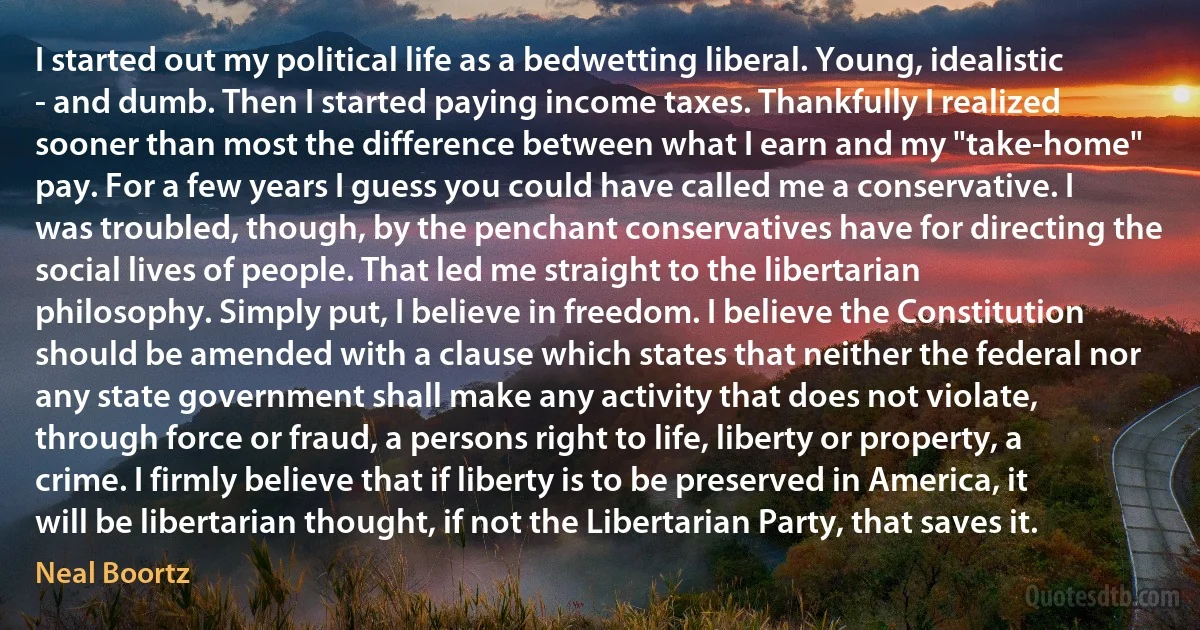
I started out my political life as a bedwetting liberal. Young, idealistic - and dumb. Then I started paying income taxes. Thankfully I realized sooner than most the difference between what I earn and my "take-home" pay. For a few years I guess you could have called me a conservative. I was troubled, though, by the penchant conservatives have for directing the social lives of people. That led me straight to the libertarian philosophy. Simply put, I believe in freedom. I believe the Constitution should be amended with a clause which states that neither the federal nor any state government shall make any activity that does not violate, through force or fraud, a persons right to life, liberty or property, a crime. I firmly believe that if liberty is to be preserved in America, it will be libertarian thought, if not the Libertarian Party, that saves it.
Neal BoortzRelated topics
believe clause crime difference earn federal few force freedom government led libertarian liberty lives life nor party pay penchant people property right should state straight tax thought young years sooner statesRelated quotes
The good fighter does "what has to be done" and does not let himself be troubled by any scepticism. [...] Given the ineptitude of the existing political groups, which, as is well known, have often forced qualified elements to move away from them, and given that what would have been desirable did not occur, which is to say, a political party as a mere force of manoeuvre in the present time, but absolutely disciplined and controlled by a superordinated group, owner of a precise inner doctrine not to be paraded in the common political struggle-given these things, the only possibilities seem to me to be those of more diffuse activity : to win, and influence with direct contacts, personalities, if possible, holding a post of command, not so much in the world of the political schemers as in that of the army, of officialdom and of business.

Julius Evola
For what advantage is it, that the world enjoys profound peace, if thou art at war with thyself? This then is the peace we should keep. If we have it, nothing from without will be able to harm us. And to this end the public peace contributes no little: whence it is said, ‘That we may lead a quiet and peaceable life.' But if any one is disturbed when there is quiet, he is a miserable creature. Seest thou that He speaks of this peace which I call the third (inner, ed.) kind? Therefore when he has said, ‘that we may lead a quiet and peaceable life,' he does not stop there, but adds ‘in all godliness and honesty.' But we cannot live in godliness and honesty, unless that peace be established. For when curious reasonings disturb our faith, what peace is there? or when spirits of uncleanness, what peace is there?

John Chrysostom
... a rather different class of applications of the idea of best allocation of scarce resources... usually referred to as the theory of optimal economic growth. In most studies of this kind made in the countries with market economies there is not an identifiable client to whom the findings are submitted as policy recommendations. Nor is there an obvious choice of objective function, such as cost minimization or profit maximization in the studies addressed to individual enterprises. The field has more of a speculative character. The models studied usually contain only a few highly aggregated variables. One considers alternative objective functions that incorporate or emphasize various strands of ethical, political, or social thought. These objectives are then tried out to see what future paths of the economy they imply under equally simplified assumptions of technology or resource availability.

Tjalling Koopmans
[The Kellog Pact is] a mighty moral bulwark against war - and we must never underestimate the effectiveness of moral bulwarks with no bayonet nor bludgeon behind them. The entry of the United States into the Permanent Court of International Justice, the growing confidence in the court, and the increase in the number of nations who have signed the Optional Clause mark definite and, I believe, irrevocable steps in the displacement of military power by judicial process in the settlement of international disputes. Public servants like us will fail in our duty if we do not diminish military power in proportion to the increase of political security...I dare affirm that, in the naval programme of the leading naval powers, there is a margin between real security needs and actual or projected strength, and the world expects this Conference to eliminate that margin.

Ramsay MacDonald
In order better to grasp the thought of Malthus, let us translate it into philosophical propositions by stripping it of its rhetorical gloss: -
"'"Individual liberty, and property, which is its expression, are economical data; equality and solidarity are not."
"Under this system, each one by himself, each one for himself: labor, like all merchandise, is subject to fluctuation: hence the risks of the proletariat."
"Whoever has neither income nor wages has no right to demand anything of others: his misfortune falls on his own head; in the game of fortune, luck has been against him."
From the point of view of political economy these propositions are irrefutable; and Malthus, who has formulated them with such alarming exactness, is secure against all reproach. From the point of view of the conditions of social science, these same propositions are radically false, and even contradictory.

Pierre-Joseph Proudhon
